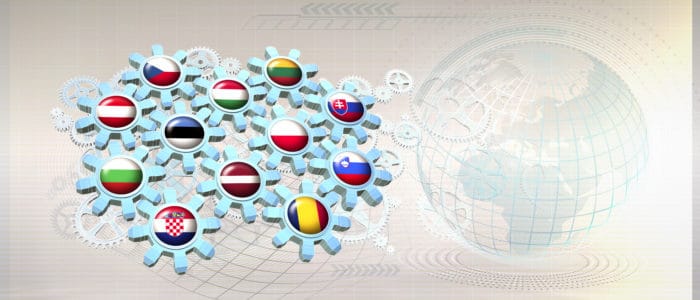Published
Three Seas Initiative: Instrument for Decreasing Dependency on Russian Energy
By: Guest Author
Subjects: Energy European Union Russia & Eurasia

Lilianna Ziedins, a student of Economics and International Studies at the American University, and an intern at ECIPE between January and April 2022.
The conflict in Ukraine has accelerated the necessity for initiatives that aim at promoting the geopolitical power of the Eastern Russian border countries. For the European Union (EU) to maintain a competitive edge economically and politically, these regional cooperation initiatives should take center stage in future policy and investments.
In current prominence is the Three Seas Initiative (3SI), a regional effort in Eastern Europe to develop infrastructure, energy, and digital projects between the Adriatic Sea, Baltic Sea, and the Black Sea. Twelve countries participate in the 3SI: Austria, Bulgaria, Croatia, the Czech Republic, Estonia, Hungary, Latvia, Lithuania, Poland, Romania, Slovakia, and Slovenia. The 3SI is intended to support regional integration amongst the 12 member countries.
Due to the historical legacy of the Soviet Union, East-West infrastructure is more developed than North-South linkages. This is a significant issue for Europe’s progressive quest for energy independence. The supremacy of East-West pipelines limits alternatives to those pipelines and has been a substantial factor in Europe’s continued energy dependence on Russia. With a Russian history of the Kremlin using its energy pipelines to blackmail the European Union economically, it is no surprise that nations in this region want independence from Russia.
In the past, the extension of cooperation of the 3SI to non-EU countries was stalled due to membership being opposed by countries with a good relationship with Russia and Visegrad states blocking the introduction of non-EU Balkan countries. However, with the ongoing Russian-Ukrainian conflict, the opposition based on relations with Russia is no longer a viable argument.
The Black Sea is a strategic location for investments and connectivity for the EU and the surrounding countries. Therefore, it is in both the 3SI’s best interest and Georgia, Ukraine, and Moldova’s to join. At the moment, Ukraine is dealing with matters beyond the capacity to think of joining the 3SI; both Georgia and Moldova should think critically of the benefits the 3SI could provide not only for them but for Europe. Strategically, Georgia has a free trade agreement with China and an Association Agreement with the EU allowing easy passage through the Caucasus region, as well as a beneficial strategy for implementing a North-South transport and energy network to open new routes for alternative suppliers.
Bulgaria’s 2021 Three Seas Initiative Summit established future steps and goals, including extending membership. In his opening speech, Bulgarian President Rumen Radev highlighted the willingness of 3SI to collaborate with other regional and global actors. At the same summit, member states declared, “We remain open to collaborate with other regional and global actors with whom we share the same democratic values, the European and transatlantic orientation goals, and common interests.” In January 2021, in a joint statement with Moldovan President Maia Sandu, the leaders of the two countries reaffirmed their interests: “We put emphasis upon the willingness to strengthen cooperation with partner countries in South-Eastern Europe and the Black Sea. In this context, we reaffirm our interest in being part of the Three Seas Initiative.” At the Batumi Summit on July 19th, 2021, the leaders of Ukraine, Moldova, and Georgia evaluated the value of 3SI, “We will explore cooperation possibilities with the Three Seas Initiative as a move towards achieving EU connectivity goals and anchoring our states physically with the EU.” The Polish and Estonian presidents have spoken about how important it is to integrate the three countries into the initiative and how the membership will provide Ukraine, Moldova, and Georgia with significant economic and political opportunities.
Without these three countries, there will always be a flaw in 3SI’s goals and strategic plan. 3SI has several projects which would utilize each country’s strategic location, such as the Rail-2-Sea which will connect cargo coming from the Black Sea to northern Europe or the Viking train, which aims to link the Baltic and Black Seas. Furthermore, the Danube–Black Sea Canal can be used for the potential development of non-EU members and promote energy security in the region. Out of the 48 priority projects conducted by the 3SI, there have been 13 non-EU countries which have been involved in at least one of the infrastructure projects.
In the past, the initiative, and its potential for enlargement, had remained ambiguous; the Russian aggression has re-established the importance of the initiative’s mandate and the need for a concrete strategy to connect to all the Black Sea states. While there is the risk of security threats currently in Ukraine, there is no reason not to engage the surrounding countries to help mitigate the current and future threats. Moreover, engaging non-EU member countries in 3SI projects can benefit the EU, especially when developing transport corridors and energy diversification. Diversifying energy sources away from Russia will shift the power dynamic in Europe and weaken Russia’s geopolitical position.